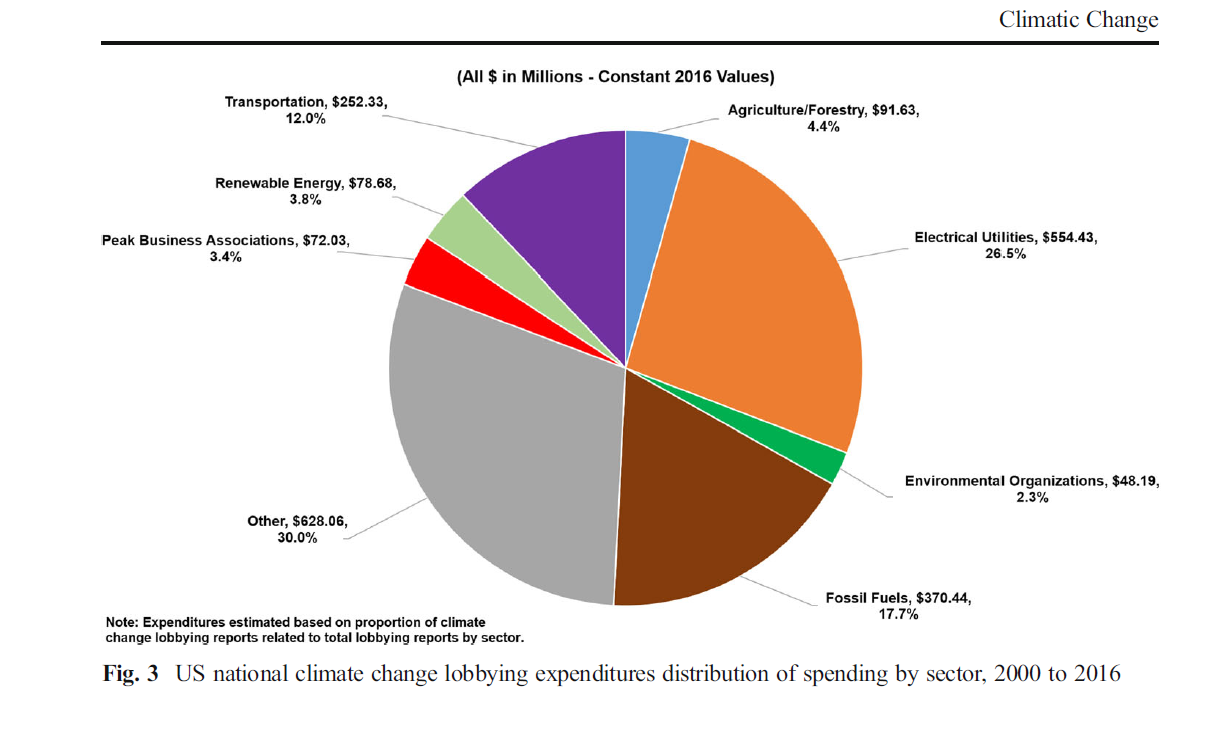
Fossil Fuel Industry Has Spent Nearly $2 Billion on Lobbying to Kill Climate Laws
From 2000-2016, the fossil fuel industry spent nearly $2 billion lobbying to prevent climate action in the US, according to a new academic study published yesterday.
From 2000-2016, the fossil fuel industry spent nearly $2 billion lobbying to prevent climate action in the US, according to a new academic study published yesterday.
The new study is by Drexel University sociologist Dr. Robert Brulle, who has long studied the actors trying to prevent climate change, whether it be the climate denial network centered around the Koch brothers, or the Donors Trust, or the fossil fuel companies themselves.
As someone myself who has written a book highlighting how the undue influence of the lobbying industry undermines our political process, and who has spent years writing about how the fossil fuel industry is one of the worst culprits when it comes to destructive lobbying, this is highly welcome research.
But when we criticise the lobbying industry, the response from our critics is always that lobbying is an essential part of our democracy and without lobbying the political process would be significantly poorer.
My response to that is lobbying is not a level-playing field. Moreover much of it goes on behind closed doors, unseen and in the shadows. That is why Tamasin Cave and I called our book, “A Quiet Word”.
And Brulle agrees with us: “Lobbying” he argues, “is an activity conducted away from the public eye.”
And why this so dangerous, is because, as Brulle, continues: “There is no open debate or refutation of viewpoints offered by professional lobbyists meeting in private with government officials. Hence, control over the nature and flow of information to government decision-makers can be significantly altered by the lobbying process, and creates a situation of systematically distorted communication.”
If only one side has the ear of government, “This process may limit the communication of accurate scientific information into the decision-making process. Accordingly, critics have assailed lobbying as a danger to democracy because it creates elite networks of decision makers that exclude the general populace”, he writes in his paper.
“Special interests dominate the conversation, all working for a particular advantage for their industry,” Dr. Brulle told ThinkProgress. “The common good is not represented.” And that is why lobbying is so dangerous. Big oil has the ear of a politician, the climate does not.
But not only does the fossil fuel industry have far greater access, it also has far greater financial resources at its disposal.
And Brulle’s research bears this out: As he states: “The vast majority of climate lobbying expenditures came from sectors that would be highly impacted by climate legislation. Environmental organizations and the renewable energy sector lobbying expenditures were dwarfed by a ratio of 10:1 by the spending of the sectors engaged in the supply and use of fossil fuels.”
His paper adds: “This analysis demonstrates that corporations with direct interest in the outcomes of climate legislation are the primary organizational actors engaged in climate-related lobbying. While environmental organizations and the renewable energy sector also have major direct interests in the outcome of climate legislation, they are relatively minor players in legislative lobbying at the federal level.”
He reaches some devastating conclusions about how effective this lobbying has been: “Despite the introduction of several major bills to limit carbon emissions in the USA, none of them have been passed,” he notes.
So the fossil fuel industry has managed to kill all the bills aimed at limiting carbon emissions. Everytime someone proposes legislation the industry mobilises. He adds that “Levels of expenditures on lobbying appear to be related to the introduction and probability of passage of significant climate legislation.”
So basically you get spikes of expenditure to kill climate bills. This is so deeply cynical, but this “finding is completely in line with the previous literature on lobbying and confirms that the levels of lobbying are driven by the salience of pending legislation.”
He concludes that “The fact that the overwhelming amount of spending on lobbying was from corporations in the transportation, utility, and fossil fuel sectors has important implications for the fate of future climate legislation.”
As bad as the situation is for those fighting for climate justice, it looks set to get worse. As Think Progress pointed out yesterday, quoting the New York Times: “Sadly, brand new IRS rules from the Trump administration ‘will no longer force Kochs and other groups to disclose donors’. That means major anti-climate groups, like Americans for Prosperity, will not have to report that it is heavily backed by the Koch brothers, who are billionaire fossil fuel barons.”
This means our job – and Dr Brulle’s – in tracking how dirty oil money undermines our democracy just got one hell of a lot more difficult, due to the climate denier in chief, Donald Trump.

